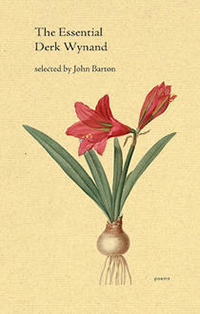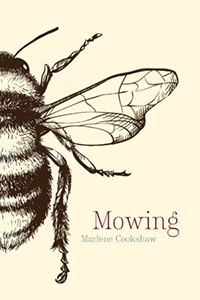Reviews
Poetry Reviews by Marilyn Bowering
The Essential Derk Wynand, edited by John Barton (Erin: Porcupine's Quill, 2020). Paperbound, 63 pp., $14.95.
Marlene Cookshaw, Mowing (London: Brick Books, 2019). Paperbound, 98 pp., $20.
 Unlike The Essential Derk Wynand which is curated by John Barton from the whole of Derk Wynand’s works, Marlene Cookshaw’s Mowing is a specific window into her ongoing concerns and development. All three—Wynand, Cookshaw, and Barton (who is thanked by Cookshaw for his work on her volume)—are former editors of The Malahat Review. Each brought a different orientation to the editorship while conveying belief in the consequentiality of literary culture. In Cookshaw, the poet’s effort to construct a life on these terms is an article of faith that survives a struggle with self and place, and with family that distrusts the ambivalences of art. In Wynand, “literary faithfulness”—to the extent that it is possible—is to the potential of language to reconstruct the terms of engagement between human beings.
Unlike The Essential Derk Wynand which is curated by John Barton from the whole of Derk Wynand’s works, Marlene Cookshaw’s Mowing is a specific window into her ongoing concerns and development. All three—Wynand, Cookshaw, and Barton (who is thanked by Cookshaw for his work on her volume)—are former editors of The Malahat Review. Each brought a different orientation to the editorship while conveying belief in the consequentiality of literary culture. In Cookshaw, the poet’s effort to construct a life on these terms is an article of faith that survives a struggle with self and place, and with family that distrusts the ambivalences of art. In Wynand, “literary faithfulness”—to the extent that it is possible—is to the potential of language to reconstruct the terms of engagement between human beings.
When he emigrated with his family to Vancouver in 1952, Derk Wynand was eight years old. The family had relocated in 1944, the year of Wynand’s birth, from the German spa town of Bad Suderode to Osterode about 80 kms across the Harz mountains. Like other small German towns, Osterode was industrialised for war purposes, in its case principally for air warfare. Its workforce was made up of civilians, internees, “half‐Jews,” concentration camp prisoners, Soviet prisoners, and other foreign workers pressed into labour, adding thousands to the town’s population. In 1944, there was a large construction project to create underground space for war production underway. At war’s end, Wynand’s father, an engineer with Organisation Todt, the military and civilian group overseeing large Nazi construction projects, was stationed in Osterode to “help build a jet‐fuel plant.”
Images from the time show a light American tank burning on the side of the road, refugees returning to the damaged town after the American advance, pushing cartloads of belongings, and troops and machinery clearing stacks of felled trees from the roads as the 16th American regiment pushed eastward.
Between 1951 and 1957 around 200,000 German citizens immigrated to Canada. In a remarkable poem, “Reconstruction,” dedicated to his brother, Wynand writes of the experience of leaving “such fire and counts of the dead” and releasing the broken things of history and “any number of values counting for nothing dismembered.” Certainty itself is abandoned: “poems long unread will never can // never again be written and mere paint will burn hand and / canvas alike.” The obliteration of borders, the primacy of food and language, a sea journey, the women “sick // of everything that refuses to give up its name,” the unfolding immigrant story in Vancouver and Surrey, at first “keeping the voice / low in public places,” becomes “sleeping with easier dreams then // talking in sleep now […] the good smoke rising from a good chimney.”
“Reconstruction” is an important piece, not only for its current resonances but for a principle I’ll call “framed uncertainty” which is raised and confronted by the counter-force of eros in Wynand’s poetry. In “Five Tattoos and One Suggested,” the poet watches an exotic dancer while with his wife. The tone is self‐interrogatory, a two‐step of guilt and desire, acknowledging and suppressing thoughts while working to describe the moment. Its spirituality is in its resolution not to be trapped by, but to never forget, the deep past of inhumanity, and to celebrate life: to attempt the impossible.
Likely Wynand’s best known poem, “Airborne,” depicts the earthbound poet as a pilot released from “the trees on Cook street shedding chestnuts and leaves” to travel “the uneasy balance of presence and absence.” The poem maintains the conceit of flight while taking in the concrete world—its places and lovers, reality and insight—the poet “at a distance” surveying present and archive, “without mouthing words that cannot add up / to truth or falsehood, flying over the world’s thin skin / and grazing it lightly, borne by nothing, by air.” It is an immersive poem, impossible to sum up. In Wynand, the framing of poetry’s fluctuating matter may be strengthened by limits. Barton’s introduction mentions a variety of Wynand’s strategies, such as line lengths and stanza breaks pre‐determined by letter count. The poems, freed from traditional structural gravitas and allied with Surrealism, achieve a lightness drawn from European modernism melded, as must be, to the inconsolable passage of time.
Where Wynand differs from other poets who understand that the only way to love the earth is to in some way leave it, is that he partners this with a love story all his own. Eros has its imperative: “you with your dreams of steamier climates, / me with mine of chasing after you south,” but the affection and playfulness that inhabit the lines are what they mean.
John Barton, in his elegant sketches of Wynand’s life and work, suggests Wynand’s late wife, Eva, as a type of Muse in the poetry. Correctly, he takes care to separate the idea from any suggestion of service to “the male gaze.” Wynand’s “framing of uncertainty” enables equality of gaze. There is no assignment of priority, one over the other: instead, there is artful, lustful, mischievous exploration that brings the narrator into awareness of his moral teeterings and longings: it is humanity as it is, under construction.
The Essential Derk Wynand is a beautiful book—highly recommended.
 The power of distrust with which Cookshaw grapples, particularly in the opening poems in Mowing, is its coupling with love’s compromises and fears. Cookshaw understands this as the tug of war between caution and care, the necessity of holding opposites in balance for stability while making room for serendipity. Her approach as a poet is to be alert to metaphors presented through direct observation, the ‘new’ leaping into view through a close‐up of the familiar—dogs, geese,
The power of distrust with which Cookshaw grapples, particularly in the opening poems in Mowing, is its coupling with love’s compromises and fears. Cookshaw understands this as the tug of war between caution and care, the necessity of holding opposites in balance for stability while making room for serendipity. Her approach as a poet is to be alert to metaphors presented through direct observation, the ‘new’ leaping into view through a close‐up of the familiar—dogs, geese,
storms, fields: “The bales appeared to rise of their own accord / from the workers’ hands…. // Water and soil conspire to multiply, to occupy / a breathing space above the field.” A “breathing space” is space to breathe where it otherwise does not exist; the phrase “of their own accord” to my ear has a biblical echo. Cookshaw’s apparent pastorals often hold complex emotions and references: at the least, the lines open to unexpected spaciousness.
Frequently, Cookshaw assists a shift from the rituals of work and weather to a welcome glimpse of the transcendent, by mix of diction. “Clunky,” “ka‐chunked, and “I figure” are examples from the quoted poem above; in others there are occasional puns like the doe that “hightails” it down the beach.” This blend is characteristic of Cookshaw’s conversational, near journaling style, often shaped into couplets in which unexpected line‐breaks soften the structure. Tension squeezes through lines that appear to be telling stories—the care of hens and donkeys, making repairs, coping with a power outage, travel notes, the effort to get upstairs to write. Their power can catch the reader unaware. The poem “The calendar,” with its alienation from regeneration cries, “Change back, change back. / Failing that be done quickly.”
Mowing references a dozen authors including Wendell Berry, Robert Hass, Simon Armitage, Molly Peacock, William Stafford, and Raymond Carver. Cookshaw may be positioned as a rural writer, drawing from life on an island, like Stafford celebrating the local in Oregon; or following Hass into descriptive, meditative poetry. But what is new in her is not from this. Her list of books is like the “breadcrumbs” of a doe’s footprints in the snow in “Invitation,” an image with a Hansel and Gretel sting. “Life: a cruel joke,” she writes, “As if having heard / the breathtaking precision of its speech, / we are given an instrument / we don’t know how to play.”
You may read Cookshaw for familiarity and the pleasure of speaking her lines aloud, but I wouldn’t want to miss their subtlety and how her poetry enfolds and lifts a hidden weight. She tends more towards Glück than Berry, with the capacity to disturb; or to the New Zealand poet, James K. Baxter, who closed his eyes, stuck his finger on a map of his country and found Jerusalem where he could.
—Marilyn Bowering









